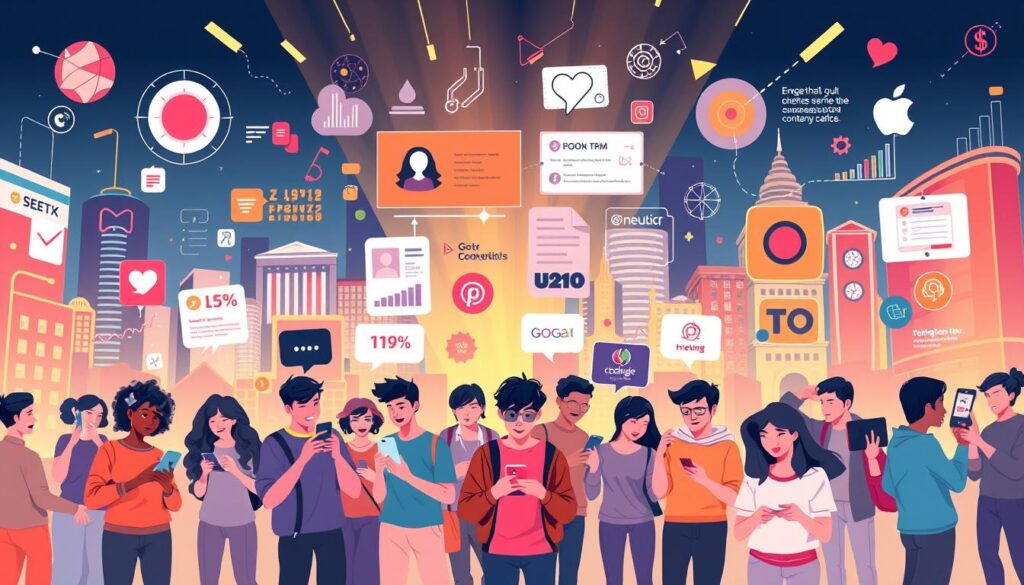The marketing landscape is undergoing a significant transformation, driven by the rapid advancement of generative AI. For businesses in the UK, this technological shift presents both opportunities and challenges. Generative AI tools, such as ChatGPT, Midjourney, and Jasper, are revolutionising how companies approach content creation, ad targeting, and customer engagement.
These tools enable businesses to automate complex tasks, from crafting compelling copy to designing visual campaigns. Predictive analytics and hyper-personalisation are becoming essential components of modern marketing strategies, allowing companies to deliver tailored experiences that resonate with their target audience. However, this technological leap also raises important ethical considerations and data privacy concerns, particularly under the UK GDPR framework.
As we look ahead to 2025, the integration of AI into marketing strategies will continue to evolve. Businesses must balance innovation with responsibility, ensuring that AI adoption aligns with ethical practices and legal requirements. This section explores the transformative potential of AI in marketing, highlighting practical applications and key considerations for UK businesses.

Key Takeaways
- Generative AI tools like ChatGPT and Midjourney are transforming content creation and ad targeting for UK businesses.
- Hyper-personalisation and predictive analytics are becoming crucial for delivering tailored customer experiences.
- UK businesses must navigate ethical and data privacy challenges, particularly under the UK GDPR framework.
- AI adoption requires a balanced approach, combining innovation with responsible practices.
Exploring the Generative AI Revolution in Marketing
Generative AI is reshaping the marketing world, offering innovative solutions for businesses. This section delves into the rise of these tools and their impact on the UK market.
Overview of Generative AI Tools
Generative AI tools like ChatGPT and Midjourney have emerged as powerful solutions for content creation and ad targeting. These tools automate tasks such as crafting copy and designing visuals, enabling businesses to focus on strategy and creativity.
By analysing vast amounts of data, generative AI tools personalise marketing messages, enhancing customer engagement. They also optimise on-page SEO elements like meta descriptions and internal linking, improving search engine rankings.
Evolving Trends in the UK Market
In the UK, traditional marketing is giving way to AI-driven strategies. AI tools now handle routine tasks, allowing marketers to concentrate on innovative strategies. Predictive analytics supports targeted campaigns, improving efficiency and effectiveness.
For instance, digital marketing strategies benefit from AI’s ability to forecast trends and personalise content, leading to higher engagement and customer satisfaction.
AI marketing strategies UK: Automating Content Creation and Ad Targeting
As businesses in the UK embrace technological advancements, the integration of generative AI tools like ChatGPT, Midjourney, and Jasper is revolutionising content creation and ad targeting. These tools not only streamline processes but also enhance creativity and efficiency, allowing businesses to deliver tailored customer experiences.
Utilising ChatGPT, Midjourney, and Jasper for Copy and Video Scripts
ChatGPT excels in crafting engaging copy, from social media posts to blog articles, in mere seconds. Midjourney and Jasper, on the other hand, are ideal for generating video scripts, enabling businesses to produce high-quality content swiftly. This automation allows marketers to focus on strategic and creative aspects, driving innovation and reducing time-to-market.
Streamlining Ad Deployment and Campaign Optimisation
Automating ad targeting using predictive analytics ensures that campaigns reach the right audience, enhancing engagement and conversion rates. By analysing vast datasets, these tools optimise ad deployment in real-time, improving ROI and campaign efficiency.
| Tool | Application | Example |
|---|---|---|
| ChatGPT | Content Creation | Generating social media posts and blog articles. |
| Midjourney | Video Scripts | Creating dynamic video content for campaigns. |
| Jasper | Copywriting | Producing compelling ad copy and marketing materials. |
UK businesses such as Marks & Spencer and Unilever have successfully harnessed these tools to enhance their marketing strategies. Marks & Spencer uses AI for personalised shopping recommendations, while Unilever leverages AI for programmatic advertising, resulting in higher engagement and improved ad performance. These examples demonstrate how AI-driven automation leads to increased campaign efficiency and better ROI, making them indispensable in modern marketing.
Enhancing Customer Engagement with AI-Driven Personalisation
Personalisation has become a cornerstone of modern marketing, and advancements in technology are taking it to new heights. By leveraging predictive analytics and machine learning, businesses can now deliver highly tailored experiences that resonate deeply with their audiences.
Hyper-Personalisation Techniques in Action
Hyper-personalisation goes beyond basic customer segmentation. It involves using real-time data to create bespoke experiences. Tools like Adobe’s AI framework, Sensei, and Braze’s Intelligence Suite adapt marketing strategies based on individual customer behaviour, ensuring messages are timely and relevant.
For instance, digital marketing strategies benefit from AI’s ability to forecast trends and personalise content, leading to higher engagement and customer satisfaction.
Leveraging Predictive Analytics for Targeted Marketing
Predictive analytics plays a crucial role in forecasting customer trends. Platforms like Bloomreach Engagement continuously analyse customer intent and behaviour to adjust content and recommendations in real-time. This level of personalisation enhances customer engagement and improves campaign outcomes.
Optimove’s Optibot provides actionable insights to predict customer behaviour, such as churn or purchase intent. By maintaining accuracy in predictive models, businesses can ensure their marketing efforts are both effective and efficient.
| Tool | Application | Example |
|---|---|---|
| Adobe Sensei | Predictive Analytics | Personalising shopping recommendations based on browsing history. |
| Braze Intelligence Suite | Behavioural Adaptation | Adjusting email campaigns based on customer interactions. |
| Bloomreach Engagement | Real-Time Analysis | Customising product recommendations during a user’s session. |
These tools exemplify how AI-driven personalisation leads to increased campaign efficiency and better ROI, making them indispensable in modern marketing.
Ethical Considerations and Data Privacy Under UK GDPR
As businesses increasingly adopt advanced technologies, ethical considerations and data privacy concerns become paramount. The UK GDPR imposes strict regulations on how personal data is collected, stored, and used, ensuring individuals’ rights are protected.
Addressing Data Privacy and Consent
Data privacy is a cornerstone of ethical business practices. Under the UK GDPR, companies must obtain explicit consent from customers before processing their data. This transparency is crucial for building trust and accountability.
For instance, Amazon’s AI recruiting tool was discontinued after it showed bias towards male candidates, highlighting the need for vigilant monitoring of AI systems to prevent discrimination.
Ensuring Transparency and Minimising Bias in AI Algorithms
Transparency in AI algorithms is essential to maintain fairness and accountability. Regular audits and Data Protection Impact Assessments (DPIAs) help identify and mitigate risks associated with automated decision-making.
Organisations must implement measures to reduce bias, ensuring AI systems do not discriminate based on protected characteristics. Non-compliance with GDPR can result in significant penalties, underscoring the importance of ethical AI deployment.
Integrating AI Tools into a Holistic Marketing Strategy
As businesses in the UK continue to embrace technological advancements, the integration of generative AI tools like ChatGPT, Midjourney, and Jasper is revolutionising content creation and ad targeting. These tools not only streamline processes but also enhance creativity and efficiency, allowing businesses to deliver tailored customer experiences.
Practical Steps for Seamless AI Adoption
Adopting AI tools requires a strategic approach. Start by identifying areas where automation can enhance efficiency, such as content creation or ad targeting. Next, implement a pilot programme to test AI tools within your marketing workflow. This allows your team to familiarise themselves with the technology and assess its impact before full integration.
Maintaining Authenticity with Human Oversight
While AI excels at automating routine tasks, human oversight is crucial for maintaining brand authenticity. Assign a dedicated team to review and refine AI-generated content, ensuring it aligns with your brand’s voice and values. This collaborative approach ensures that while AI handles the heavy lifting, humans retain creative control and strategic direction.
For instance, companies like Marks & Spencer and Unilever have successfully harnessed these tools to enhance their marketing strategies. Marks & Spencer uses AI for personalised shopping recommendations, while Unilever leverages AI for programmatic advertising, resulting in higher engagement and improved ad performance.
| Tool | Application | Example |
|---|---|---|
| ChatGPT | Content Creation | Generating social media posts and blog articles. |
| Midjourney | Video Scripts | Creating dynamic video content for campaigns. |
| Jasper | Copywriting | Producing compelling ad copy and marketing materials. |
By following these steps, businesses can seamlessly integrate AI tools into their marketing strategy, enhancing efficiency without compromising on authenticity. This balanced approach ensures that technology complements human creativity, driving innovation and delivering exceptional customer experiences.
Real-World Success: AI Innovation in UK Businesses
Innovative applications of technology are driving measurable outcomes for businesses across the UK. Leading companies are leveraging advanced tools to enhance customer experiences and streamline operations, setting new benchmarks for success.
Case Studies from the Retail and Advertising Sectors
Retail giants like Marks & Spencer have embraced technology to deliver personalised shopping recommendations, resulting in a 15% increase in customer engagement. Similarly, Unilever has harnessed predictive analytics for programmatic advertising, achieving a 20% improvement in ad performance and ROI.
Examples of Hyper-Personalised Customer Experiences
Hyper-personalisation is transforming how businesses interact with their audiences. By analysing real-time data, companies can now offer tailored recommendations and content, significantly enhancing satisfaction levels. For instance, a UK-based retail chain saw a 25% rise in sales after implementing AI-driven personalisation strategies.
| Company | Industry | Application | Outcome |
|---|---|---|---|
| Marks & Spencer | Retail | Personalised Recommendations | 15% Increase in Engagement |
| Unilever | Advertising | Programmatic Advertising | 20% Improvement in ROI |
These examples highlight how businesses are achieving tangible results through innovation. By integrating advanced tools into their strategies, companies are not only enhancing efficiency but also delivering exceptional customer experiences. For more insights on AI’s role in the UK, visit this resource.
Looking Ahead: Future Trends in AI-Enhanced Marketing
The future of marketing is poised for significant transformation, driven by cutting-edge technologies that promise to redefine how businesses connect with their audiences.
Emerging Technologies and Multimodal AI
One of the most exciting developments on the horizon is the rise of multimodal AI. This technology enables systems to process and analyse multiple forms of data—such as text, images, video, and audio—simultaneously. For businesses, this means more sophisticated tools for creating dynamic, multimedia campaigns that captivate diverse audiences.
Anticipated Shifts in Consumer Interaction and Engagement
As AI evolves, consumer interactions are expected to become even more personalised. Advanced predictive analytics will allow businesses to anticipate customer needs with greater accuracy, delivering tailored recommendations and offers. Additionally, the emergence of AI-generated video content and virtual influencers promises to revolutionise social media and advertising, offering cost-effective yet impactful ways to engage consumers.
UK businesses can prepare for these changes by embracing data-driven decision-making and investing in tools that enhance customer personalisation. By staying ahead of these trends, companies can maintain a competitive edge and deliver exceptional customer experiences.
Conclusion
As we look to the future, it’s clear that generative AI will play a pivotal role in shaping modern business practices. The UK market has already seen significant advancements, with companies leveraging AI to enhance customer interactions and streamline operations. By embracing these technologies, businesses can deliver more personalised experiences, driving engagement and satisfaction.
Key insights from the UK market highlight the importance of maintaining ethical standards and data privacy. Tools like ChatGPT and Midjourney have revolutionised content creation, while predictive analytics ensures targeted campaigns. To integrate these tools effectively, businesses should adopt a phased approach, starting with pilot programmes and ensuring human oversight to maintain brand authenticity.
Looking ahead, the potential for AI to transform marketing is immense. With a focus on innovation and ethical practices, businesses can unlock new opportunities, delivering exceptional customer experiences and staying competitive in a global landscape.









